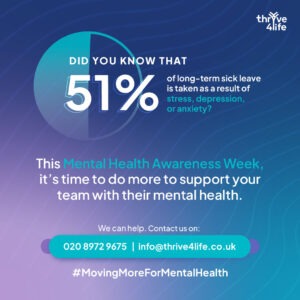In the UK, over 1 in 4 people experience a mental health disorder each year. However, despite the prevalence of mental ill-health amongst our population, there still exists a strong stigma which often pushes people to suffer in silence. Unfortunately, in the workplace, this silence can be amplified, especially if people don’t feel able to speak openly about their mental health challenges due to the fear of judgement, negative consequences for their career progression, or because their employers/managers will view them differently.
Shockingly, out of the 60% of employees in the UK experiencing anxiety and 56% exhibiting symptoms of depression, recent research has revealed that only 10% are currently seeking support for their mental health. Statistics like these emphasise just how crucial it is to introduce strategies that best support your employees’ mental health and emotional wellbeing so that you can cultivate a culture of transparency and support in your workplace.
This week is Mental Health Awareness Week, and while supporting your team’s mental health should be something you commit to every week of the year, Mental Health Awareness Week provides us all with a reminder of the importance of reflecting on our team’s mental health and reaffirming and improving our commitments to their wellbeing.
There’s no better time to take action: raise awareness of mental health in your workplace, solidify your mental health support and improvement strategies, and demonstrate just how much you value your employees’ health and wellbeing by pairing promises with actions.
What is Mental Health Awareness Week?
Mental Health Awareness Week is an annual week-long campaign that takes place in May every year. With a vision for promoting good mental health care for everyone, Mental Health Awareness Week is designed to promote better understanding of mental health while also fighting to tackle the stigma which prevents people from speaking about the mental health issues they might be facing and receiving the support they need to conquer these illnesses.
Each year, the campaign focuses on a new theme, which helps to spotlight the multifaceted aspects of mental health and how we can all lead more mentally healthy lives. For the theme of this year’s Mental Health Awareness Week, “Moving More for Mental Health”, we’re zooming in on the mental health benefits of physical activity. Indeed, this year’s theme focuses on the healing power of movement, encouraging us to explore the benefits of physical activity for our emotional wellbeing and urging us to prioritise daily exercise
How does movement support our mental health?
- It improves sleep quality
- It can boost self-confidence
- It can improve brain function
- It can reduce stress levels
- It helps reduce symptoms of anxiety and depression
Mental Health in the Workplace
With more than half of the global population currently in work, the significance of prioritising mental health in the workplace cannot be overemphasised. In fact, research shows that the cause of around 51% of long-term sick leave is as a result of stress, depression, or anxiety. This statistic alone highlights the urgent need for better mental health support in the workplace, underlining just how important it is for us all to strengthen our workplace mental health strategies and keep our teams happy, healthy, and equipped to thrive.
A workplace grounded in support and open communication will not only promote a culture of trust and community, but it will also greatly improve employee wellbeing. By implementing supportive strategies, you’ll create an atmosphere where employees feel psychologically safe to talk about their mental health and seek support when needed.
Additionally, beyond workplace morale, there is no doubt that happy and engaged workplaces have lower costs and reduced employee turnover. A happy and healthy team also results in a more productive team, with 60% of employees saying they’d feel more motivated if their organisation took action to support mental health. Cultivating positive wellbeing in the workplace will improve engagement and productivity levels, allowing employees the opportunity to reach their full potential and thrive.
Therefore, as employers, it is imperative to take proactive steps to support your employees’ mental health to create a workplace culture of openness, positivity, and productivity. Acknowledging the significance of Mental Health Awareness Week and the benefits of “moving more for mental health” can be great first steps in raising awareness.
If you’re struggling to brainstorm strategies to implement in the workplace, here are some easy ways you can improve mental health for both yourselves and your employees:
How Can You Improve Mental Health in Your Workplace?
Take charge of kick-starting the conversations surrounding mental health. Allocate some time in the week for regular one-to-ones or schedule monthly check-ins with your team members to help employees feel comfortable to speak up. Regular check-in appointments will show staff that you value their wellbeing and are willing to listen.
Sometimes, it’s easier to open up away from the pressures of the office. That’s where a walking meeting in a nearby park or down the road to a café can help your team members talk openly. Walking meetings are also great for incorporating movement and fresh air into the working day.
Most jobs will either offer an hour or half-hour break for lunch, and it is essential to remind everyone to take full advantage of it. Taking a break can allow us time to recharge and de-stress so that we can return for the afternoon feeling more energised, productive, and focused. It’s not just important for our mental health but our physical health too; sitting for too long can increase our risk of developing chronic diseases, such as heart disease or diabetes.
everyone to take full advantage of it. Taking a break can allow us time to recharge and de-stress so that we can return for the afternoon feeling more energised, productive, and focused. It’s not just important for our mental health but our physical health too; sitting for too long can increase our risk of developing chronic diseases, such as heart disease or diabetes.
Have your lunch outside with colleagues to get some sun and fresh air or take a short walk into town to get a coffee and a sandwich. Going on a walk during lunch breaks helps clear your head and restore your motivation in preparation for returning to your desk.
3. Lead by Example!
To show your team that you’re serious about supporting their mental health, you must also demonstrate commitment to the cause and lead by example. It’s important to send clear messages to your staff as they will take cues from how you behave.
Here are just a few ways you can use your leadership role to demonstrate awareness of your team’s mental health:
- Adopt healthier working habits
- Don’t work anti-social hours
- Refrain from sending work communications outside of working hours
- Take your full lunch break
- Don’t avoid difficult conversations
- Plan group activities
- Most importantly, talk about your own mental health to encourage others to do the same!
4. Raise the Profile on Mental Health
Spread awareness by raising the profile on mental health in your workplace.
At Thrive4Life, we offer people like you company-wide access to monthly educational wellbeing talks and webinars delivered by leading medical consultants and wellbeing experts at the forefront of their fields. These types of events help empower and educate employees on their health and wellbeing while creating a lasting impact and dismantling the stigma which can surround mental illness in our workplaces. Past mental health-focused webinars have included talks on stress led by Karen Liebenguth, executive leadership coach and mindfulness teacher with over 15 years of experience, as well as webinars centring around stress and emotional resilience led by Cheryl Isaacs, chartered psychologist and author.
5. Commit to Learning
Navigating mental health in the workplace can feel overwhelming at first and it’s perfectly OK not to have all the answers – but it is important to commit to learning more every day.
If you’re in need of assistance or resources, here at Thrive4Life, our highly experienced wellbeing consultants can help you improve mental health in your workplace with our training courses and guidance honed from years in the field of workplace wellbeing. For more information, take a look at our:
- Wellbeing Consultancy Services: Our team of professionals will help to identify your wellbeing needs, design tailored solutions to resolve any issues your team are encountering, and evaluate the success of these new wellbeing strategies to allow your company to move forward with better wellbeing.
- Line Management Training Course: We’ve designed this training course to equip line managers with the skills to manage employees’ stress and mental health effectively.
- Mental Health First Aid Training Programme: This course equips delegates with the skills they need to provide first-line support for colleagues experiencing mental health issues or crisis.
6. Raise Awareness through Internal Communications

There’s no better way to spread awareness than by utilising internal communications to keep the conversation about mental health going.
At Thrive4Life, we offer monthly health and wellbeing newsletters aimed towards your employees that offer up-to-date information and guidance on a vast range of mental and physical health-related topics. These newsletters break stigmas, spread awareness, and educate everyone in the workplace on a wide range of topics pertaining to all the pillars of health and wellbeing.
7. Encourage Staff to Take Time for Themselves
Beyond just reclaiming their lunch break, you should encourage staff to take time for themselves to rest and recharge. This includes promoting a healthy work/life balance and encouraging employees to take annual leave and not work outside their set working hours.
Not only does taking time off mitigate the risk of burnout, but it also allows employees to prioritise their own personal time and keep their mental health on an even keel.
8. Know Where to Go for Support
At times, there may be challenges that fall beyond your expertise, so it is important to know where to turn if you require additional support, whether for yourself or an employee. Here are some trusted resources you can rely on for further support:
In Summary
Mental Health Awareness Week is one of the most important weeks of the year. It serves as the perfect opportunity to consider how you can make mental health in your workplace even more of a priority by concretising and improving current strategies and introducing fresh provisions that effectively support both yourself and your team. By kickstarting an open dialogue around mental health, you’ll not only create a more supportive workplace, but you’ll also ensure your team are aware of and able to use the resources and support available to them whenever they need it.











